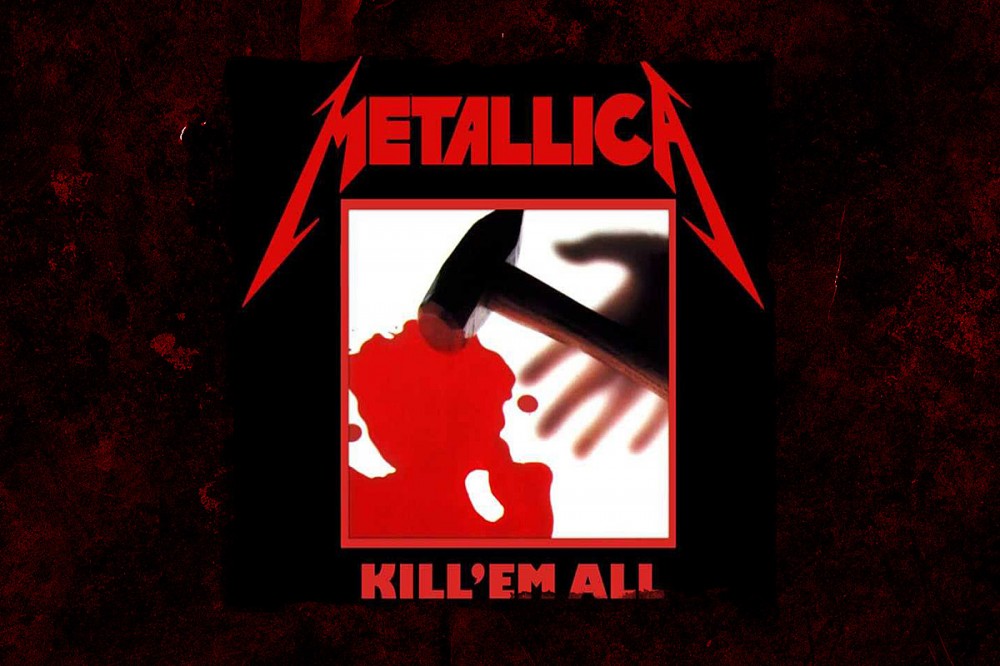
38 Years Ago: Metallica Start the Thrash Revolution With ‘Kill ‘Em All’
When Dave Mustaine was abruptly fired from Metallica and shipped off to Los Angeles on a Greyhound bus, he sputtered to James Hetfield, “Don’t use any of my shit!”
Metallica didn’t obey his request, either out of spite or from the conviction that the rest of the band contributed to the songs, as well, so they belonged to the entire group and not just to Mustaine. While they gave their former guitarist writing credit for “Jump in the Fire,” “”Phantom Lord,” “Metal Militia” and “The Four Horsemen” — an expansion of their No Life Til Leather demo track “The Mechanix” — they didn’t ask him if they could use them. Had they done so, Metallica’s debut Kill ‘Em All, which came out on July 25, 1983, might have sounded pretty different.
Metallica, “Jump in the Fire”
Essentially, Metallica revamped and cleaned up No Life Til Leather and added “Whiplash,” “No Remorse” and the wild wah-wah-saturated Cliff Burton bass solo track “(Anesthesia) Pulling Teeth.” The band’s label Megaforce took an if-it-ain’t-broke mentality to the record, which was shaped and fine-tuned at the legendary Music Building in Queens, a slummy warehouse practice space where Metallica lived while they worked on the album. Megaforce even encouraged guitarist Kirk Hammett to replicate the leads from the demo. When he said he was uncomfortable doing that, they compromised and Hammett started each solo in the vein of the demo track and then expressed himself on the rest of the song.
Metallica, “Whiplash”
In addition to wanting to stay true to the winning formula of No Life Til Leather, Megaforce was under tight time constraints. Realizing Metallica’s sound was groundbreaking, but that other bands were playing music of the same ilk, they wanted to put out their record before anyone else had a chance to steal their thunder.
“The way we did it was just like, we go in there, do it, knock it out, next,” Hammett told Loudwire a couple years ago. “Go in there, do it, knock it out, next. Go in there, do it, knock it out, next. There wasn’t a lot of time to second guess anything. It was all just about going for it.”
The raw immediacy of Kill ‘Em All is a large part of the album’s charm. The songs are simple, direct and faster than pretty much anything else that was released at the time, with the exception of Motorhead and maybe Venom. And through their alcohol-haze, Metallica were somehow able to keep their playing tight and their performance urgent.
“In retrospect, I think that if we did have more time to work on that album, it wouldn’t have sounded the way it does,” Hammett said. “When I think of Kill ‘Em All, I think of it being very visceral. We weren’t second guessing ourselves because we didn’t have time to do that.”
Metallica recorded Kill ‘Em All at Music America Studios in Rochester, N.Y., with an unlikely team. Staff producer Paul Curcio’s claim to fame was working with the Doobie Brothers in 1971, and Chris Bubacz had engineered the hard rock band The Rods. Since Metallica had worked on material for the record for so long, the songs didn’t require any re-arranging and basically all the producers had to do was roll tape. However, since they weren’t used to recording metal bands, they set the board levels the way they used to track traditional rock bands. The levels spiked and the recording was initially overdistorted. To reduce oversaturation, they dropped the levels on the guitar and boosted the drums. Then, when Megaforce president Jonny Zazula complained that the drums were too loud and the guitars weren’t razor-edged enough, the producers tried to fix it in the mix, with some degree of success.
Even if Kill ‘Em All isn’t the best recorded thrash album of all time it’s definitely one of the most influential, directly opening the floodgates for Slayer, Exodus, Anthrax, Testament and Overkill to play bigger venues, and turning on legions of fans and musicians to a new form of metal that combined the speed of punk with the razor-edged attack of Judas Priest. Even though the album never entered the top 100 of the Billboard album chart (it peaked at #120), it sparked the thrash metal revolution and by 1991 the album finally went platinum; in March, 1999, Kill ‘Em All was certified triple platinum by the RIAA and Metallica continue to play songs from the album in concert, including “Seek & Destroy,” “No Remorse” and “Metal Militia.”
Metallica, “Seek and Destroy”
Loudwire contributor Jon Wiederhorn is the author of Raising Hell: Backstage Tales From the Lives of Metal Legends, co-author of Louder Than Hell: The Definitive Oral History of Metal, as well as the co-author of Scott Ian’s autobiography, I’m the Man: The Story of That Guy From Anthrax, and Al Jourgensen’s autobiography, Ministry: The Lost Gospels According to Al Jourgensen and the Agnostic Front book My Riot! Grit, Guts and Glory.
Every Metallica Song Ranked